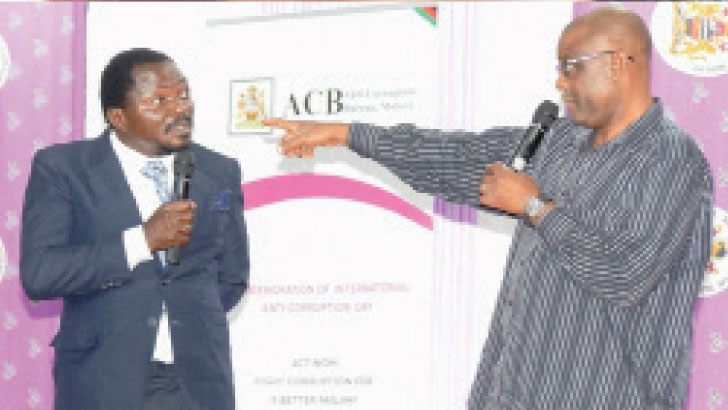More changes proposed at ACB
Anti-Corruption Bureau (ACB) has disclosed that increase of penalty for corruption offences from 12 years to life imprisonment is among the amendments it want considered in the Corrupt Practices Act (CPA).
The bureau, after interaction it had with Malawians, wrote the Ministry of Justice and Constitutional Affairs to consider amendments to the Act.
ACB spokesperson Egrita Ndala, in a response to a questionnaire, said the bureau also proposed to the Ministry of Justice that appointment of ACB director and deputy should be done by the Public Appointments Committee of Parliament (PAC), not as is the case now where the President makes the appointment of the bureau’s director.
It is widely believed with the current arrangement; political considerations are made when appointing the bureau’s top dog.

ACB, according to Ndala, also wants to have powers of arrest in some circumstances that require urgent exercise of such powers
“[We also proposed] increased protection of whistle blowers, power to prosecute offences discovered while investigating corrupt practices under the Act [and] expansion of definition of public body to include limited liability companies controlled by government,” she said.
The ACB spokesperson said the proposed amendments are addressing specific challenges, adding there is a general view that the punishment for corruption offences does not reflect the seriousness of such offences in the country.
“It is not deterrent enough. The current mode of appointing ACB director still needs to be strengthened. Deputy directors should as well be appointed after a competitive process unlike the current scenario.
“The law does not give powers of arrest to ACB unless a warrant is issued by a court. This requirement deprives ACB from arresting people committing an offence on the spot,” Ndala said.
She said whistleblowers have been victimised and people fear to report corruption. She said the current provision is not adequate.
“Currently there is a mandate to investigate other offences outside CPA discussed when pursuing CPA offences but not prosecution of such offences.
“ACB has faced challenges to prosecute cases in limited liability companies owned by government. There is some ambiguity which needs to be clarified,” Ndala said.
Ministry of Justice and Constitutional Affairs spokesperson Pirirani Masanjala told this paper earlier that it is not their job to push for an amendment, explaining that the ministry only follows what people of Malawi want.
“We can only provide guidance when we receive the instructions. You may wish to know that the ACB has, as of now, sent instructions [to us] to amend the Corrupt Practices Act,” Masanjala had said.
If the ministry succeeds to give guidance, and finally have the Bill tabled in Parliament for amendment of Act, it will be the Bill’s second coming, after it was previously shot down when Democratic Progressive Party (DPP) was in power, using its numerical strength.
As it was previously arranged, the Bill sought to amend the Corrupt Practices Act, Cap. 7:04 of laws of Malawi (the “Act”) in order to enhance the independence of the operations of the ACB.
Some legal experts also, in earlier interviews, believe ACB could meaningfully prosecute cases if the requirement to seek consent from the Director of Public Prosecutions (DPP) is removed.





